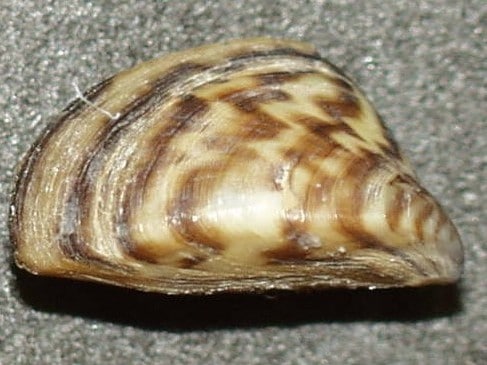
 For the first time, invasive zebra mussels have been discovered in the state of Montana, leaving municipal leaders north of the border in BC wondering if they’re next.
For the first time, invasive zebra mussels have been discovered in the state of Montana, leaving municipal leaders north of the border in BC wondering if they’re next.
“It’s alarming,” said Vernon, BC, city councillor Juliette Cunningham, as reported in the Vernon Morning Star. “It’s devastating. They reproduce so quickly, it’s shocking. We’re not taking this seriously enough.”
The “we” in this scenario is BC’s provincial and municipal governments and the “it” is the take-over of North America’s freshwater lakes by zebra and quagga mussels, species that originated in the Black Sea region of Eurasia and first arrived in North America in the late 1980s, carried in the ballast water of transoceanic ships. Since then, the zebra and quagga have made quick work of numerous waterways across the continent, infesting the Great Lakes, the Mississippi River Basin, the St. Lawrence River, all the way up to Lake Winnipeg in Manitoba and down to Lake Mead in Nevada.
Once the mussels enter an ecosystem, they crowd out other native mussel species and dramatically alter the entire food web and the tiny shells colonize surfaces like docks, boats and even beaches, causing serious damage by clogging up intake structures at water treatment and power plants.
“Essentially, what zebra and quagga mussels do for a living is eat phytoplankton; they filter it out of the water column, which leaves little food for the zooplankton,” said Shawn Devlin, assistant research professor at the Flathead Lake Biological Research Station in northwestern Montana, in conversation with the Flathead Beacon. “If there is no zooplankton, there is no food for other fish to grow, so all the nutrients and energy that was going into phytoplankton and zooplankton and bigger fish now goes into the mussels. It completely clears the lakes, and turns the trophic cascade into a dead end.”
Montana officials confirmed in November that the invasive mussels had entered the Tiber Reservoir in north-central Montana, which tested positive for the larvae of aquatic mussels. As a result, the park officials temporarily closed watercraft access to a number of lakes and ponds, including Glacier National Park.
“This is a huge deal. We have been bracing ourselves for this for a long time and hoped it would never happen,” Tom Bansak, assistant director of the Flathead Lake Biological Station. “Well, it’s here, it’s now, it’s real, and the only possible chance of getting rid of them is finding them early and in a localized area.”
Meanwhile in BC, the provincial government is operating a fleet of boat inspection stations to keep contaminated hulls from getting into BC waterways. The province has eight permanent stations operating seven days a week in the summer, ten hours a day. “BC is leading the fight against invasive species,” said premier Christy Clark earlier this year. “To date, no zebra or quagga mussels have ever been detected in B.C.’s waterways and we’re going to keep it that way.”
Not enough, says the Okanagan Basin Water Board, which has called for inspection stations to expand their hours and for the implementation of tougher rules requiring all watercraft entering the province to report to an inspection station before launching. “There are a lot of holes in [border] inspection,” says Councillor Cunningham. “They are only open until 10 pm in the summer.”
In May of this year, BC conservation officers reported stopping a vehicle towing a boat that carried invasive mussels, one which failed to stop at an inspection station near Elko, close to the U.S. and Alberta borders. The boat underwent a complete decontamination and a violation ticket was issued for failing to stop at an inspection station.
Leave a Reply
You must be logged in to post a comment.




 Share
Share Tweet
Tweet Share
Share




Comment